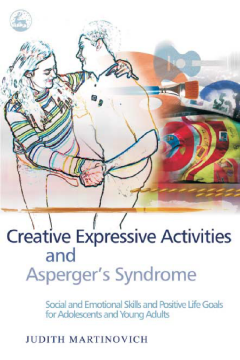
Additional Information
Book Details
Abstract
Individuals with Asperger's Syndrome (AS) benefit from a positive, affirming support of their individuality. This forward-looking book focuses on building individual strengths and resilience, rather than modifying perceived weaknesses, through individualized therapy within a group context.
Integrating psychological and educational theory with a variety of creative therapies, Judith Martinovich combines activities such as art making, drama, music, puppetry, yoga and photography with conventional cognitive behavioral interventions to support individuals with AS. The different activities complement and reinforce each other and are designed to address specific traits of the autism spectrum to aid skills development. Although created primarily for use with adolescents and young adults, the practical and versatile activities can be adapted for different age and skill levels, objectives and settings. Informed by contemporary research, they meet the objectives of a framework of principles drawn from Positive Psychology and Social and Emotional Learning. Creative Expressive Activities and Asperger's Syndrome is a comprehensive resource for parents as well as teachers, social workers, psychologists and arts therapists who wish to link therapeutic goals with creative activities for people with or without Asperger's Syndrome.
Judith Martinovich has a working background in art and textile design, personal experience with Asperger's Syndrome, and a Masters of Literature in Psychology (Australia) and Master of Arts in Counseling (USA). She has worked with individuals and groups with Asperger's Syndrome in Australia and the United States. Judith has integrated her qualifications and experience with an ongoing desire to build sound bridges between academia and creative therapies. She has two children, Chris and Anna, lives with her husband in Dover, New Jersey, and works in private practice with creative therapies with people of all ages.
The book is written in a clear and informative way giving straightforward descriptions of Asperger's syndrome and how the traits are experienced by individuals. The first half of the book gives all the explanations and information needed for those working or caring for adolescents and young adults who have Asperger's syndrome. The second half gives activities or exercises with clear objectives for those working or caring for those with Asperger's either individually or within a group setting. A really good read that will stay with me for quite some time.
Play Therapy U.K
This book communicates a strong belief that adolescence can be a time of great personal growth if the young person is given the opportunity to be seen as a unique, worthy individual. Using Positive Psychology and Social Emotional Learning models, Judith Martinovich provides information on how to run a group for adolescents with AS around themes of cognitive processes, social competence and self-awareness. As a multi-faceted approach is required to meet the complex needs of Adolescent with AS activities for use in the group include creative music, art and movements techniques as well as discussion and role play with its sound theoretical base and personal as well as professional advice it is likely that this book will be valuable for a number of counselor, teachers and some parents.
Youth In Mind
Martinovich offers a cognitive behavioural approach based upon Positive Psychology and Social and Emotional Learning. The two approaches complement each other in promoting satisfaction, happiness, resilience, affirming individuality and building on individual strengths... a book that will, provide lots of ideas for any practitioner in search of fresh ideas for workshop material.
Lapidus Quarterly
Martinovich offers a crisp, goals-oriented approach to Asperger's therapy, with special emphasis on the creative, experiential aspects of learning.
Obsessive interests, social difficulties, literalness and lack of empathy, verbal clumsiness, difficulties with organization and problem solving, poor motor skills, and a lack of self-consciousness and understanding complex emotions often characterize Asperger's Syndrome (AS). Martinovich first provides an overview of various cognitive behavioral interventions, such as positive psychology and social and emotional learning, which strive to instill a sense of satisfaction, happiness and resilience, affirming individuality and building on strengths. But, she suggests, 'the best strategy to help AS individuals supports the whole person, not just outstanding traits,' and Martinovich is no milquetoast. Though the creative arts to which she devotes the majority of the book are congruent with AS's way of thinking, they are also challenging, both in their group milieu and the need for talents often foreign to someone with AS. Step by step, she takes readers through creative therapies... including painting, drama, dance, music, photography, storytelling and more... explaining objectives as well as modes of implementation.
Martinovich is tough, but she wants her intentions and motivations to be bell clear: She is here to make a difference.
Kirkus Reports
